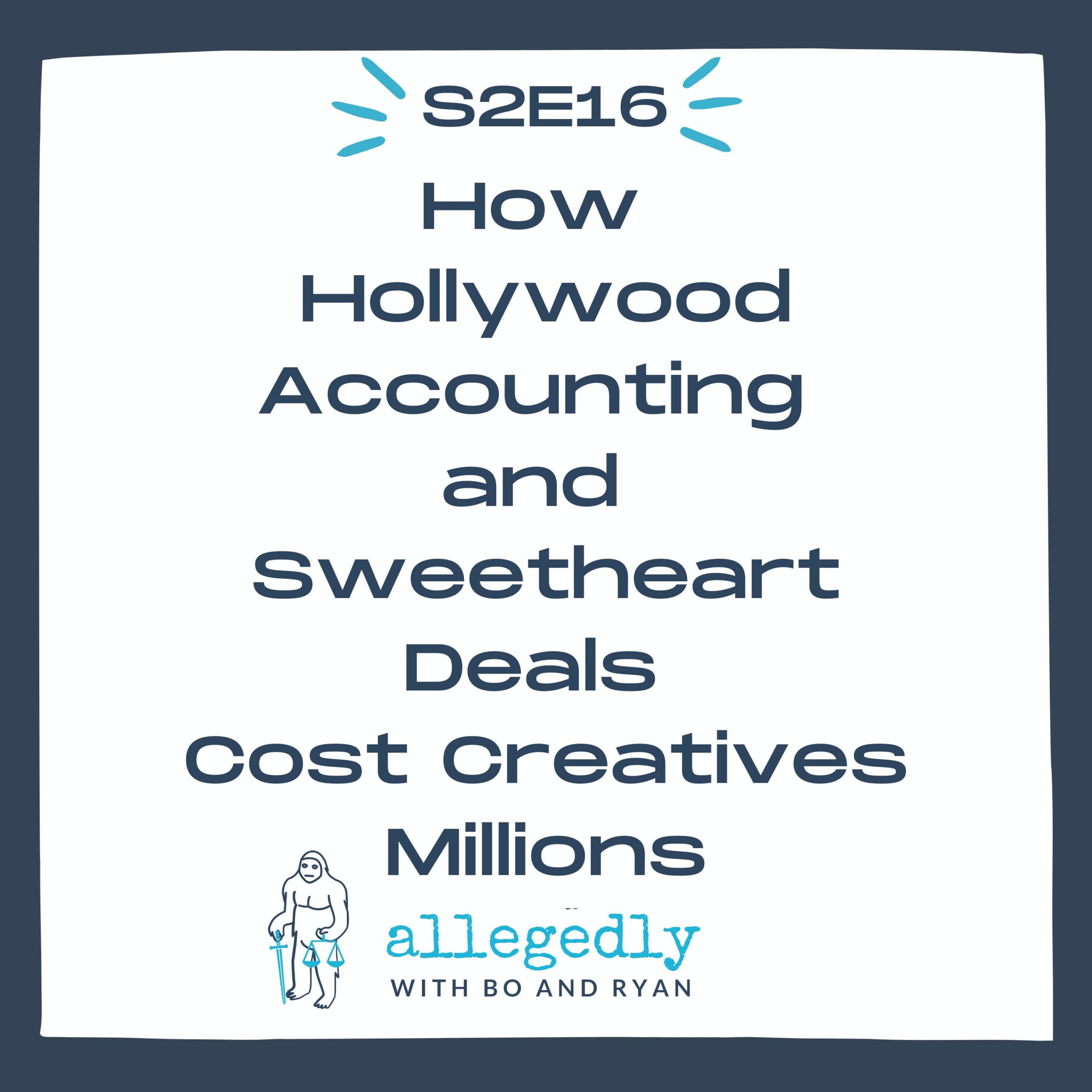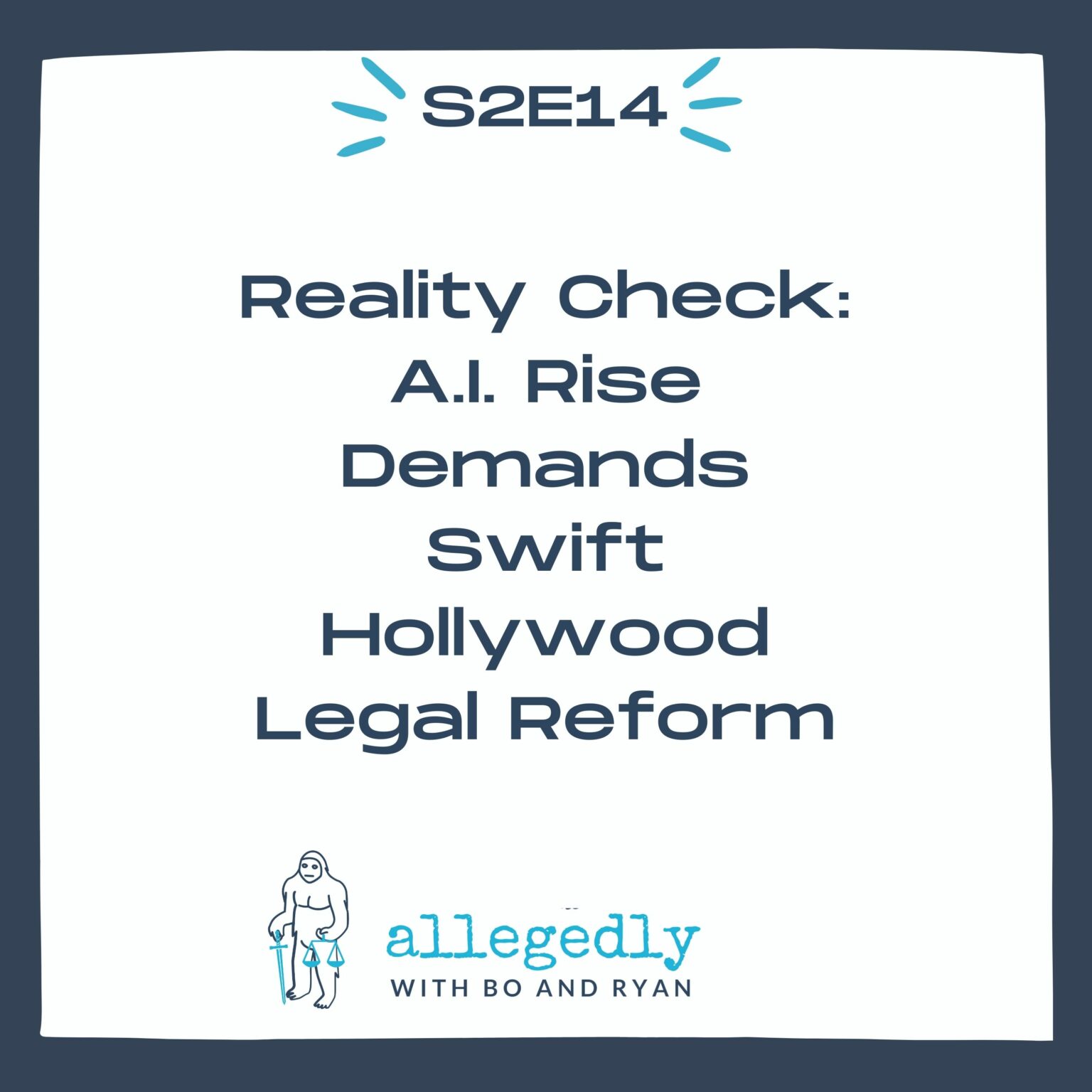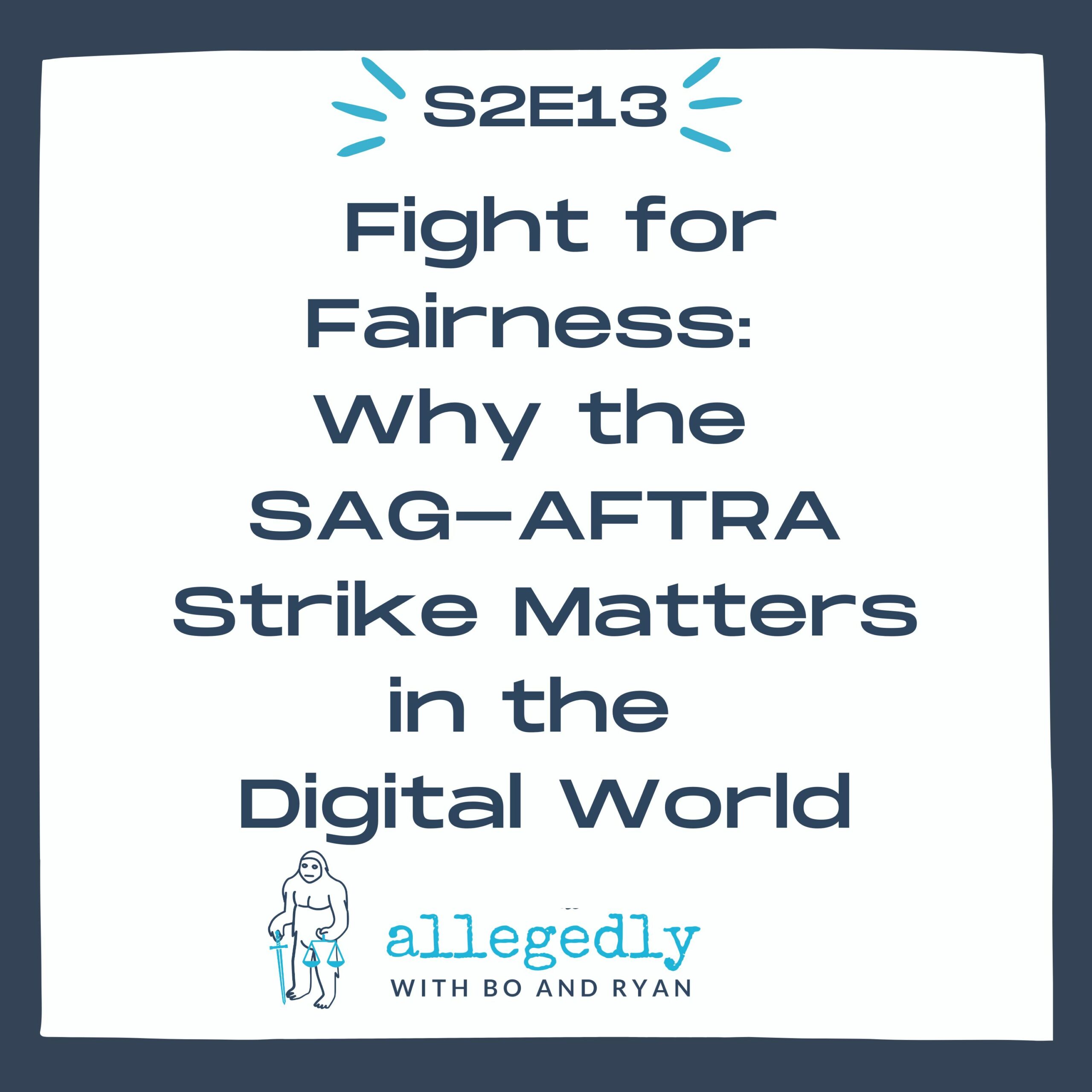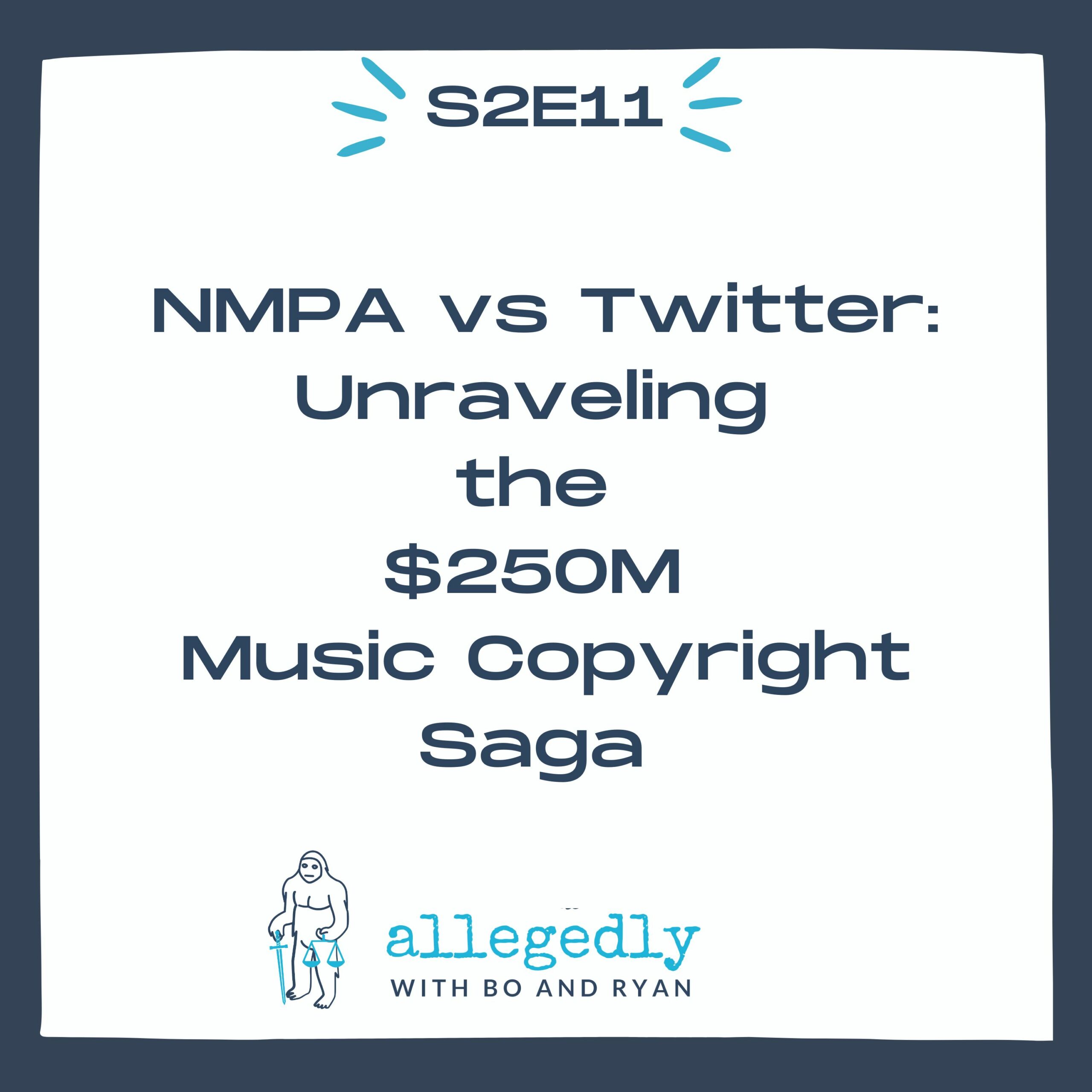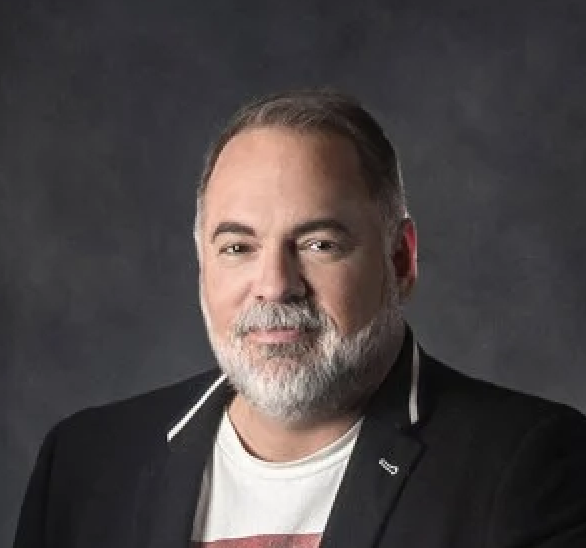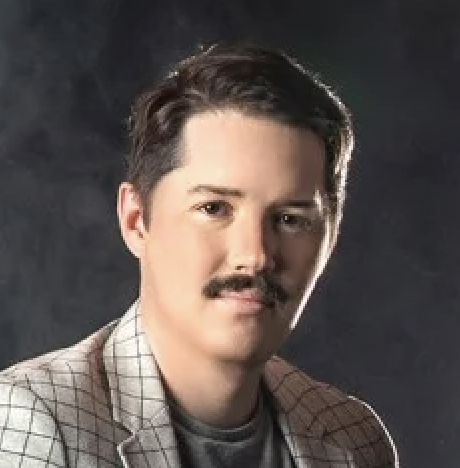allegedly with Bo and Ryan | Season 2 Episode 15
Allegedly… with Bo and Ryan Podcast S2E15| Transcript
Bo: [00:00:00] Welcome back to Allegedly with Bo and Ryan. I’m Bo.
Ryan: [00:00:04] And I’m Ryan. Together, we’re your entertainment lawyers here to try to keep you informed, entertained, and lawsuit free.
Bo: [00:00:11] Fair enough. That’s a worthy goal, my friend. So I think you would agree with me, Ryan. I mean, we we’ve basically been talking about two things for the last–seems like years–but the last several weeks.
Ryan: [00:00:24] Sure.
Bo: [00:00:24] Possibly months. And that’s I and the current writers strike and actor’s strike. I mean, these two strikes are dominating every discussion we have with all of our clients. And the writers strike has just hit the 100 day mark. And while there apparently is some discussions going on, I haven’t really seen anything that gives me a lot of hope that a resolution is imminent.
Ryan: [00:00:51] Oh, for sure. And I don’t even think that the actors and the producers are even talking at the moment. I mean, it’s hard to reach an agreement if you’re not even at the table.
Bo: [00:01:00] You know, it kind of makes me wonder as I think about it, why don’t they try getting all three groups in the room at one time? You know, the writers, the actors and the producers; see if they can somehow, you know, break the logjam that way. I mean, I guess I’m thinking of it from the perspective of our job, you know, because as lawyers, it’s certainly not all that unusual to have three parties involved in a conflict. And we’ve certainly had, you know, mediation, settlement conferences where we’ve had all three parties meet together and try to reach that mutual resolution. But I don’t think that’s ever really been done before in the entertainment arena. Historically, every union, every guild reaches an agreement with the AMPTP independently.
Ryan: [00:01:51] Yeah, that’s right. And the longer these strikes go on with no end in sight, we are getting a lot of questions from clients about how the strike compares to the past strikes. I saw that the longest WGA strike of all time was 1988 and that was 154 days. You know, we’re by the time this episode comes up, we’re pushing 120, you know, and there’s no end in sight. I guess the hope is that the past history can shed a little light on what we may be able to do and what we can expect.
Bo: [00:02:20] Well, I’ve got a lot of questions about that, too. And, you know, it couldn’t hurt to do a little bit of a deep dive into the tumultuous waters of Hollywood’s past strikes. There actually haven’t been all that many, but some of the ones that did occur were pretty wild.
Ryan: [00:02:39] Oh, yeah. I mean, based on some of the stories we’ve talked about, it may be worth grabbing your popcorn and settling in. If Hollywood weren’t on strike, you literally could make a movie about the past Hollywood strikes and it would have everything. It would have passion, drama and billions of dollars at stake.
Bo: [00:02:58] Well, we should probably start by saying that, for those of you that aren’t familiar, okay, the entertainment industry is easily the most unionized industry in the world. I know when you know lay people probably just hear the word union, they’re automatically thinking of things like, you know, the AFL-CIO, United Auto Workers, American Federation of Teachers, Fraternal Order of Police, you know, those type of things. But in terms of just the number of people in a particular industry that are union members, the entertainment industry hands down, number one. You know, with these strikes, of course, we’re talking about the Writers Guild of America and the Screen Actors Guild. But that’s just the tip of the iceberg. Here’s here’s a list of a few more. Just off the top of my head, the largest is IATSE International Alliance of Theatrical Stage Employees. It represents most crew members. But there’s also, you know, the American Federation of Musicians, the Directors Guild of America, the Teamsters– and Teamsters are, you know, people a lot of times don’t think of that as being an entertainment industry, but they represent all of the drivers, both on, you know, during movies themselves, as well as on set and as part of the crew when, you know, you’re just moving equipment and things like that.
Ryan: [00:04:29] Good points.
Bo: [00:04:30] But even under IATSE, okay, there’s many, many, many sub guilds, basically their own unions. You’ve got they’ve got the Animation Guild, Production Sound Video Engineers Guild. What else? Motion Picture Editors Guild, of course, the Makeup Artists Hairstylist Guild, International Cinematographers, Costume Designers, Art Directors. They all have their own guilds.
Ryan: [00:04:57] And I believe that the VFX artists under Marvel are seeking unionization under IATSE, as well as production assistants.
Bo: [00:05:05] Right. All hoping to make, like these, an independent guild underneath IATSE. So, you know, I’m sure I’m missing many, many others. I mean, the point is, if you’re in the entertainment industry, you’re likely a part of one of these unions. And the history of Hollywood really is completely intertwined with the history of these unions. I mean, agency goes all the way back to about 1900. I mean, which is obviously the beginning of theater.
Ryan: [00:05:34] Right.
Bo: [00:05:35] Movies, you know, And they they’ve been around since pretty much the beginning. And honestly, that’s a damn good thing because, whether you know it or not, making movies and television, that is a ton of work under, a lot of times, grueling conditions. And these unions and guilds have been crucial to protecting the rights of people working behind the scenes.
Ryan: [00:06:04] 100%. And we are huge union supporters. It’s not just about the actors and writers, of course. These unions represent the collective voice of thousands of workers in the entertainment industry. Unions and guilds have been instrumental in ensuring fair wages, working conditions, creative rights. They’ve played a pivotal role in shaping the industry’s labor standards and often acting as the moral compass in a world driven by profits.
Bo: [00:06:30] Yeah, exactly. I mean, so that’s kind of the background. People just need to understand unions and guilds are inextricably linked with the industry itself. So most union and guild members from our experience are very appreciative of the protections that have been built in by the unions over the years, and they are fiercely loyal to them. I mean, I think that’s why you see those numbers like 99% of the actors voted to support the strike and to and to stand with the Screen Actors Guild. They know if the Screen Actors Guild is fighting for it, it’s probably worth fighting for. And it’s important. But I mean, it’s coming at a tough cost.
Ryan: [00:07:19] Huge cost.
Bo: [00:07:19] The dual strikes by the actors and the screenwriters, it has effectively paralyzed Hollywood. And it’s the kind of thing that we did see in the past. You have all these protests, the walkouts, the labor actions.
Ryan: [00:07:38] I mean, the impact is huge. I mean, the combined effect of these strikes itself is estimated right now to be at least $4 billion. This isn’t just about those big studios. It trickles down to design shops, craft services, janitorial contractors, caterers, restaurants and even the local businesses that rely on the bustling activity of a film set.
Bo: [00:08:01] It definitely has a domino effect. When Hollywood stops, there is a vast ecosystem that feels those tremors. I mean, we’ve certainly felt it.
Bo: [00:08:12] Oh, for sure.
Ryan: [00:08:13] And our business has been hugely impacted. But like all these others, we aren’t going to back down either. We will stand firmly behind the actors and writers until they are offered a deal that they believe is fair. But that brings us, of course, to the main question What is fair? And that’s where looking at past strikes may not be as informative as the people that have asked us about it are really hoping. And the reason is because the issues that were so crucial back then during past strikes have largely been settled and the issues that are front and center now were never even contemplated in those past strikes.
Ryan: [00:09:05] Hollywood strikes have seen such an evolution. In the early days, it was really about safety and basic working conditions. But post 1950, I’d say the narrative shifted to residuals, replays, distribution rights, and these 2023 strikes are centering on the evolution of technology in ways that no one ever dreamed of in the past, especially in the age of streaming and digital content, and AI.
Bo: [00:09:32] I don’t want to sound naive. I mean, obviously money is still a part of it, and things like residuals is going to play a role and is a role. I mean, money is always going to be a part of it, in every single industry on earth, not just the entertainment industry. But in this case, I feel very comfortable in saying, this strike is not just about the money. If it were purely the financial issues, I truly believe it would likely be over by now. But no, I mean, you start adding in all these issues with the burgeoning technology and AI. It’s about respect. It’s about recognition. It’s about ensuring that as the industry evolves, that the rights of the people that work in that industry are evolving along with it.
Ryan: [00:10:28] Well, if we were going to make a movie about it, say, as with any great story, there needs to be this menacing antagonist and enter the Alliance of Motion Picture and television producers, the AMPTP.
Bo: [00:10:42] Dum dum, dum.
Ryan: [00:10:43] Starting as a conglomerate of studio heads. It is now includes the new titans of the industry: the streamers and major production companies.
Bo: [00:10:51] Well, if you boil it down, the AMPTP, their role, they’re negotiating on the part of the studios. And while they primarily represent the business side of things, you got to remember, for the writers and the actors, this strike is going well beyond just business. This is about human talent and creativity. It may sound like hyperbole, but when you start considering what’s at risk here with generative AI, which I know we have talked about many times, you are truly, literally talking about the future of Hollywood and its ability to tell human stories, the kind of stories that resonate with the human heart.
Ryan: [00:11:45] For sure. And I saw something recently that that actually made me laugh a little bit. You know, AMPTP stands for the Alliance of Motion Picture and Television Producers, but there is a Producers Guild of America who is really pissed off right now and also on the line supporting SAG and WGA. And they’re like, We are the real producers that actually make these shows. You know, Bob Iger, CEO of Disney, you know, you aren’t a producer. You know, you’re also running Disneyland, right? But since we’re getting asked so many questions about the history of strikes, I thought it’d be good if we just outline some of those major strikes in the past. One of the most dramatic ones was in 1945, and it became known as the Bloody Hollywood strike. It was easily the most violent strike the entertainment industry has ever seen.
Bo: [00:12:36] Oh, for sure. I mean, you look at some of the images that came. All right. Let me set the scene. All right. October 5th, 1945. Friday. Okay. Later known as Bloody Friday.
Ryan: [00:12:53] Oof.
Bo: [00:12:55] Here we are. We’re in LA. It’s late October, but for whatever reason, it’s just unseasonably hot that day. There’s a union named the Conference of Studio Unions, and it represented a little over 10,000 crew members, primarily painters, carpenters, other similar crew members. And they had already, at this point, by this October 5th, 1945, they had already been on strike for almost eight months.
Ryan: [00:13:26] Good lord.
Bo: [00:13:26] And so on. This morning, they had planned this massive demonstration outside of Warner Brothers Studios and Warner Brothers caught wind of this. Okay. So they gathered together in preparation for this demonstration. All these police officers, all their own security guards. This side is also joined with, you know, all the scabs that are coming in to replace these workers, and basically [the studio also] hired thugs and goons. Okay. And so you would not believe what happened. It’s early morning. The strikers had planned this demonstration. And so right on cue, right on signal, an American flag begins to be raised and all of the strikers begin singing The Star Spangled Banner.
Ryan: [00:14:24] No way.
Bo: [00:14:25] Okay. So it’s like it’s supposed to be like this kind of touching, nice moment. And right as they begin to sing, suddenly things start flying towards them. Basically flare guns are getting shot at the demonstrators. And then all of these police, security guards, thugs, scabs, they rush in and begin physically attacking the strikers. It led to what was probably the single most violent brawl in Hollywood history.
Ryan: [00:15:00] It’s pretty crazy to read about. There’s even pictures of it. And the cops rush in and they start bashing people’s heads, faces, bodies. People get dragged away and thrown in paddy wagons. Women are being beaten up. There’s even a photo of three cops beating on a bloody man lying motionless on the ground. And here’s a quote from one of the news articles about that day. “Some among the hundreds of strikers and their supporters were knifed, clubbed and gassed, while others were swept off their feet by spray from fire hoses. The glass of smashed windshields littered the pavement and there were tear gas bombs, blasts and overturned cars. Fistfights at times engaged as many as a dozen men or more.”
Bo: [00:15:45] Yeah, that sounds pretty wild. Yeah, pretty bad. So luckily, that level of violence has not occurred since then. But let’s be honest. I mean, the underlying fight between billion dollar studios and the people who actually keep them running, well, that fight is definitely still alive and well.
Ryan: [00:16:10] Oh, for sure. I mean, for people outside the industry, A lot of times they don’t think about making a movie as work. They think about it as magic.
Bo: [00:16:23] Just don’t peek behind the curtain.
Ryan: [00:16:25] Oh, no, no, no. But making movies and television requires extremely hard labor and plenty of it. I mean, the reason things turned so violent back in 1945 was because crew members were expected to work obscenely long hours in unsafe working conditions. They got paid practically nothing while the studios raked in the money and finding jobs was was hard. I mean, employment was very unsteady.
Bo: [00:16:51] There’s been a ton of progress since then, obviously, but a lot of those same complaints are being made today, especially about the unsteadiness of employment. That 1945 1946 strike lasted about 13 months, but it did finally end. One of the results of it was the CSU basically merged with IATSE, but significant progress was made at that time regarding the treatment of workers. So then you have to fast forward another 14 years to 1962 until the next major strike. And what was so significant about the 1960 strike is that was actually the last time that both the writers and actors were on strike at the same time.
Ryan: [00:17:42] ANd if you want to look at those numbers from 1960, the writers were on strike for 153 days.
Bo: [00:17:49] Which we are approaching now.
Ryan: [00:17:51] Definitely. And the actors were on strike for 43 days, which again will be hitting right as this episode airs.
Bo: [00:17:58] I mean, it’s hard to make any direct correlations between that strike and this one because the issues were just I mean, they were so different. It’s funny because the boogeyman back in 1960, what everybody was so upset about was television. You know, TV had just started, you know, becoming huge. And there were all these movie actors who were upset because they weren’t getting residuals when their the movies they had made were playing on television. So it was just it was a new medium, just kind of like some of the things we’re dealing with now. But by the end of that 1960 joint strike, the actors and the writers, they had both won salary bumps. They had worked out a system for residuals when movies were shown on television. But I think the most significant development out of that strike, though, was the creation of pension, health and welfare funds for union and guild members.
Ryan: [00:19:07] Oh, that’s a huge victory for the workers and a key benefit even today, of being a member of a union or guild. Writers strikes [have] definitely been the most common in the past. The writers had to strike for 111 days in 1973. It was 96 days in 1981 and 154 days in 1988. And all three times they ended up accomplishing their goals of fair pay and increased residuals.
Bo: [00:19:32] I think the writers strike, though, that most people remember was the one that started in 2007 and ended in 2008. I certainly remember that one very well. You know, it seemed much longer, but that strike actually only lasted 100 days. Really, shorter than the one that we’re facing now. The key issue at that time, you know, just like we talked about before, that television was this new medium. Well, in 2007, 2008, the Internet was really taking off and it was the new medium. So the key issue then was the rise of digital content on the Internet and people downloading shows instead of just watching them on television. And I mean, by all measures, that strike was also a success. It set compensation for ad supported streaming programs. It increased residuals for downloaded movies and shows. But it had a pretty devastating impact on a lot of people. The California economy alone lost probably in the neighborhood of about $2 billion.
Ryan: [00:20:46] Wow.
Bo: [00:20:47] And also, you can argue with me whether this is a positive or a negative thing. But remember, you know, when you’ve got a writers strike, you can move forward with content that’s not scripted. So it led directly to the burgeoning explosion of reality television. Yes, I know that makes you happy, Ryan, because it ultimately led to ‘Below Deck.’
Ryan: [00:21:13] My guilty pleasure, of course. But so much attention has been paid–for good reason–to the writers and actors. But when productions get shut down, it really does impact everybody, every member of this entire entertainment industry.
Bo: [00:21:28] Well, and it goes beyond that. It’s not just members of the industry. It impacts all the businesses that support and serve the industry.
Ryan: [00:21:37] Yeah, no. A good point. And we don’t have an end in sight. And the total economic impact already is in the billions of dollars so many businesses serve this industry craft services, design shops, janitorial contractors, literally dozens of other businesses. And a lot of these companies are having to cut hours, lay off workers, and some are having to close altogether.
Bo: [00:21:59] The worst part about it. In terms of timing is that, you know, you’re talking about companies that barely made it through Covid and now are getting hit a second time. But this time, unlike Covid, there’s no government benefits to help.
Ryan: [00:22:17] Yeah. To sum it all up, we understand why these strikes are happening and we support them 100%. The future of Hollywood and art itself hangs in the balance, but we do feel for all the people affected, and hope that the AMPTP offers up some real solutions soon.
Bo: [00:22:35] Looking back at Hollywood’s past strike history–although it is filled, as we talked about with drama and adversity–it’s also filled with resilience and hope. And the fact of the matter is every strike has ended and every strike resulted in progress. And these will, too.
Ryan: [00:23:01] And speaking of endings, that’s our show for today. As always, we are here to keep you informed and entertained. So until next time, stay in the know. And remember, Hollywood isn’t just about the stars. It’s about the countless individuals working tirelessly behind the scenes.
Bo: [00:23:17] Thanks for tuning in to Allegedly with Bo and Ryan. Stay safe and we’ll catch you in the next episode.








